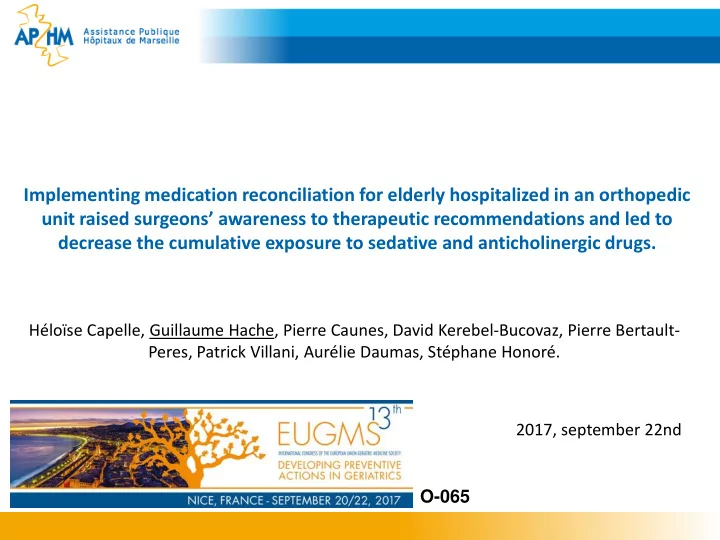

Implementing medication reconciliation for elderly hospitalized in an orthopedic unit raised surgeons’ awareness to therapeutic recommendations and led to decrease the cumulative exposure to sedative and anticholinergic drugs. Héloïse Capelle, Guillaume Hache, Pierre Caunes, David Kerebel-Bucovaz, Pierre Bertault- Peres, Patrick Villani, Aurélie Daumas, Stéphane Honoré. 2017, september 22nd O-065
Conflict of interest Nothing to disclose
Context MGMT Emergency department specialists Geriatrician GP Home Orthopedic unit / Nurse Nurse surgery Post discharge Multidisciplinary Geriatric Mobile Team (MGMT) - Missions: - medical issues related to elderly patients - preventing geriatric syndrome post discharge - Comprehensive geriatric assessment Implementing medication reconciliation during the geriatric 2017 assessment of elderly patients hospitalized in orthopedy
Process MGMT Emergency department specialists Geriatrician GP Home Orthopedic unit / Nurse Nurse surgery Community Pharmacy Clinical Pharmacist Post discharge • Medication history • Potentially innapropriate prescription identification (START/STOPP) • Medication review • Therapeutic recommandation short / medium term Objective: to evaluate the impact of this process on in-hospital prescriptions and exposure to sedative and anticholinergic drugs
Medication reconciliation Admission Medication history Demographics Polypharmacy: n 58 10 ± 4 medications per patient Sex ratio 70F/30M 10 mdt Mean age 88 ± 5 y.o. Delay MGMT after admission 3,3 ± 2,5 7 mdt 5 mdt Lenght of stay 10,1 ± 5,7 Comprehensive geriatric assessment Medication reconciliation Living status (home/nursing home) 91/09 Cognitive impairment 49% 218 Unintentional discrepancies (UD) 3,9 ± 2,8 UD per patient Delirium 51% 94% of patients at least one UD Mobility impairment 72% History of falls 40% omission omission Poor nutrition status 19% Polypathology (>3) 61% dose-posologie dosage ADL (activity daily living) ( ≤ 4) 28% administration adminsitration IADL ≤2/4 48% Mood disorders 39%
Medication review Potentially inappropriate prescriptions 18% overuse 41% underuse 18% misuse UD 23% 188 Therapeutic recommandations 3,4 ± 2,2 per patient vs 2,0 ± 1,7 (p<0,01) Acceptance rate during hospitalization: 71 ± 29 % vs 53 ± 38% (p<0,05)
Medium term impact Exposure to sedative and anticholinergic drugs, Drug Burden Index (DBI) : Hilmer et al.2007 Admission DBI: 1.09 +/- 0.72 Discharge DBI: 0.81+/- 0.58 p<0,01 - Associated with a long term decline of cognitive functions in elderly Hilmer et al., 2009 - Associated with increase in falls, GP visits and death Nishtala et al., 2014, Ruxton et al., 2015; Salahudeen et al., 2015 90 days outcomes: Mortality : 12,5% Re-hospitalization rate: 12,5%
Perspectives To optimize the transmission of medium/long term recommandations Rehabilitation Discharge: SSR Nursing home EHPAD Home Domicile Death décès Preliminary study : 26 patients – phone call to rehab 4-7 days post discharge - MGMT recommandations integrated within the transmissions: 19 - Physicians in rehab facilities who had received the information: 15 93,9 ± 0,1% were taken into account ( vs 57,3 +/- 0,3%) Physicians in post-discharge facilities are keen to apply therapeutic recommandations suggested by in-hospital MGMT … If they are aware of
Thank you ! Internal medicine / geriatry Orthopedic units Pr P. Villani Dr P. Caunes Pr JN. Argenson Dr A. Daumas Pr S. Paratte Dr M. Pellerey Dr D. Lami Dr N. Gobin Dr J. Sbihi Dr AL Couderc Pharmacy Dr S. Cohen Pr P. Tropiano D. Kerebel-Bucovaz Dr P. Bertault-Peres Dr M. Fabre Dr B. Blondel P. Niédrée Pr S. Honoré Dr M. Ollivier Dr G. Armagnian Dr H. Capelle Dr C. Solari Dr MA Estève Dr R. Guillermet Dr F. Correard Dr C. Tabelé N. Poletto Hôpital de la Timone
Recommend
More recommend